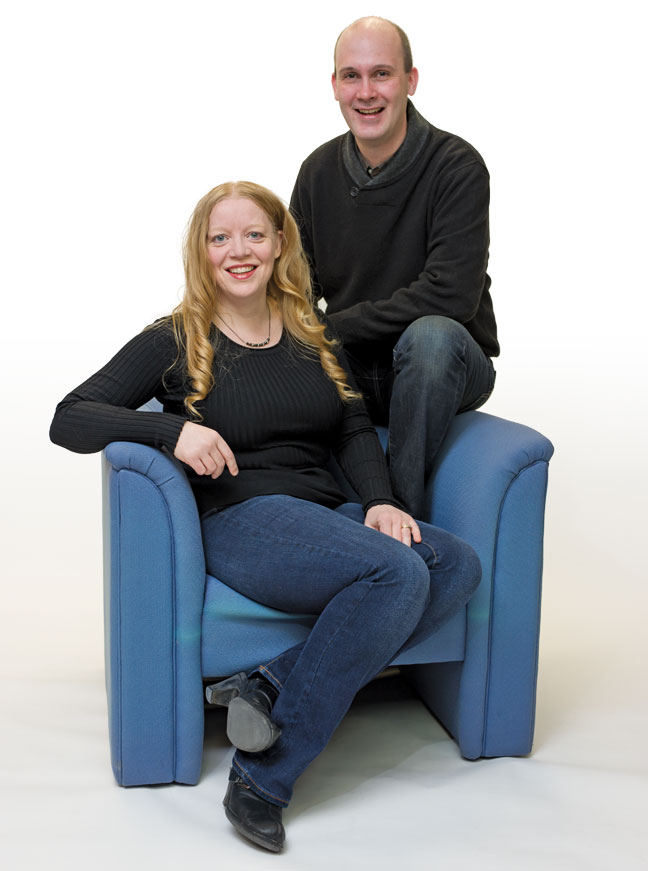A group of young adults meets at the corps for Bible study, followed by games at a nearby park. A Ready to Serve class spends a Sunday afternoon bringing smiles to residents at a long-term care facility. A vulnerable child at a fresh air camp learns that Jesus loves him.
The many expressions of youth ministry across Canada and Bermuda are as diverse as the territory itself. Yet they all have a common goal.
“We want kids to develop a faith that's Christ-centred and others-focused,” says Kevin Slous, territorial director of discipleship.
“We don't want to just develop a social club—kids can get that anywhere,” he adds. “So what is unique about what they can get when they come into our ministries? The fact that our mandate is to make disciples of them. Everything should be working toward that end.”
Putting the focus on discipleship is top priority for Kevin and his wife, Sheryl Slous, children and youth consultant. Their creative approach to youth ministry is contributing to a new vision for the territory.
Focus on Innovation
Kevin and Sheryl have more than 30 years in full-time youth ministry combined, but they've been active in leadership since their teens, when they served as young people's sergeant-majors at their respective corps. Before joining the youth department at territorial headquarters in June 2014, Kevin and Sheryl spent two years at the Army's Salvation Factory in the U.S.A. Eastern Territory. Unique in the Army world, Salvation Factory is an “imaginarium” where staff focus on innovation, developing new and creative ways to further the mission of The Salvation Army.
“The process was research, develop and design, then create resources and training,” Kevin explains. “This means, before we start churning stuff out, we take the time to understand why we're doing it.”
Kevin and Sheryl believe the development process that was used at Salvation Factory will be of great benefit to the work they now do in Canada and Bermuda.
“You learn to think creatively and innovatively, and not just settle for the first idea,” Sheryl says. “It's asking, what are all the possible ways we could tackle this lesson or this principle that we need to instill in our young people? And then asking, of these ideas, what are the best ways?”
“It helps distill ideas from good to better to best,” Kevin adds.
reCalibrate
Applying this process to youth and children's ministry has meant rethinking the way the Army does discipleship.
“In the past, I think our default was to say that discipleship is curriculum, whether it's a Bible study, Sunday school, corps cadets or Ready to Serve,” says Kevin. “We need those pieces but discipleship is so much more than curriculum, and when we limit our discipleship focus to that, we create a compartmentalized faith.”
“Everything we do is part of the discipleship journey, and that journey starts at a child's earliest exposure to the gospel,” adds Sheryl. “It's a long process so our strategy needs to be long.”
With the Slouses, the youth department at territorial headquarters has developed reCalibrate, a list of 14 priority areas for the territory. These priorities include identifying essential and irreducible minimums in healthy Salvationist ministry to children and youth, reinvesting in ministry to families, using emerging technology to enhance mission, re-emphasizing junior and senior soldiership, and assessing current curriculum and developing new materials as needed.
At this time, the Slouses are working on a number of projects, including materials for junior and senior youth councils, Ready to Serve, tools and training to equip youth and children's workers, as well as enhancing the Army's ministry online. But a main focus is creating a filter through which all youth ministries can evaluate the work they are doing. “That filter tool is important in recalibrating us because we have to know what we are recalibrating to,” says Sheryl.
“There's a lot going on in the Army for young people, which is a real strength,” she continues. “Our department is looking at all of it and trying to bring everyone in youth ministry together, onto one page. We realize that everybody's ministry unit is going to look different, depending on where you are, who your kids are. But the essentials—the non-negotiable, irreducible minimums of a healthy youth ministry—have to be the same no matter where you go.”
As they help re-envision the Army's youth ministry, Kevin and Sheryl are encouraged by the faith and commitment they are already seeing in children, youth and those ministering to them across the territory.
“I believe youth want to live out their faith and make a difference in the world,” says Sheryl. “They're moved to action and that's a real strength. We need to work on helping them get that into all areas of their lives, so those passions are not just reserved for church or camp or youth councils, but would invade their whole lives.”
The many expressions of youth ministry across Canada and Bermuda are as diverse as the territory itself. Yet they all have a common goal.
“We want kids to develop a faith that's Christ-centred and others-focused,” says Kevin Slous, territorial director of discipleship.
“We don't want to just develop a social club—kids can get that anywhere,” he adds. “So what is unique about what they can get when they come into our ministries? The fact that our mandate is to make disciples of them. Everything should be working toward that end.”
Putting the focus on discipleship is top priority for Kevin and his wife, Sheryl Slous, children and youth consultant. Their creative approach to youth ministry is contributing to a new vision for the territory.
Focus on Innovation
Kevin and Sheryl have more than 30 years in full-time youth ministry combined, but they've been active in leadership since their teens, when they served as young people's sergeant-majors at their respective corps. Before joining the youth department at territorial headquarters in June 2014, Kevin and Sheryl spent two years at the Army's Salvation Factory in the U.S.A. Eastern Territory. Unique in the Army world, Salvation Factory is an “imaginarium” where staff focus on innovation, developing new and creative ways to further the mission of The Salvation Army.
“The process was research, develop and design, then create resources and training,” Kevin explains. “This means, before we start churning stuff out, we take the time to understand why we're doing it.”
Kevin and Sheryl believe the development process that was used at Salvation Factory will be of great benefit to the work they now do in Canada and Bermuda.
“You learn to think creatively and innovatively, and not just settle for the first idea,” Sheryl says. “It's asking, what are all the possible ways we could tackle this lesson or this principle that we need to instill in our young people? And then asking, of these ideas, what are the best ways?”
“It helps distill ideas from good to better to best,” Kevin adds.
reCalibrate
Applying this process to youth and children's ministry has meant rethinking the way the Army does discipleship.
“In the past, I think our default was to say that discipleship is curriculum, whether it's a Bible study, Sunday school, corps cadets or Ready to Serve,” says Kevin. “We need those pieces but discipleship is so much more than curriculum, and when we limit our discipleship focus to that, we create a compartmentalized faith.”
“Everything we do is part of the discipleship journey, and that journey starts at a child's earliest exposure to the gospel,” adds Sheryl. “It's a long process so our strategy needs to be long.”
With the Slouses, the youth department at territorial headquarters has developed reCalibrate, a list of 14 priority areas for the territory. These priorities include identifying essential and irreducible minimums in healthy Salvationist ministry to children and youth, reinvesting in ministry to families, using emerging technology to enhance mission, re-emphasizing junior and senior soldiership, and assessing current curriculum and developing new materials as needed.
At this time, the Slouses are working on a number of projects, including materials for junior and senior youth councils, Ready to Serve, tools and training to equip youth and children's workers, as well as enhancing the Army's ministry online. But a main focus is creating a filter through which all youth ministries can evaluate the work they are doing. “That filter tool is important in recalibrating us because we have to know what we are recalibrating to,” says Sheryl.
“There's a lot going on in the Army for young people, which is a real strength,” she continues. “Our department is looking at all of it and trying to bring everyone in youth ministry together, onto one page. We realize that everybody's ministry unit is going to look different, depending on where you are, who your kids are. But the essentials—the non-negotiable, irreducible minimums of a healthy youth ministry—have to be the same no matter where you go.”
As they help re-envision the Army's youth ministry, Kevin and Sheryl are encouraged by the faith and commitment they are already seeing in children, youth and those ministering to them across the territory.
“I believe youth want to live out their faith and make a difference in the world,” says Sheryl. “They're moved to action and that's a real strength. We need to work on helping them get that into all areas of their lives, so those passions are not just reserved for church or camp or youth councils, but would invade their whole lives.”










Leave a Comment